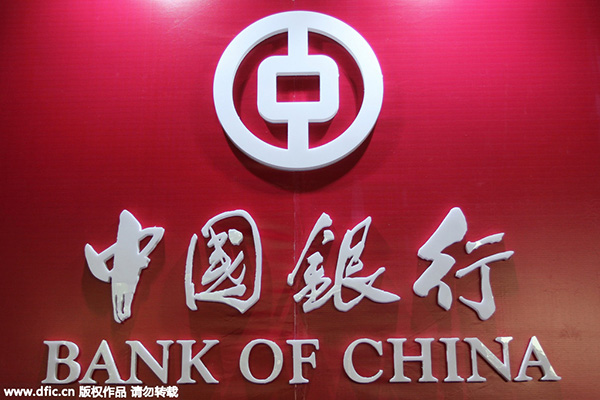BOC weighs legal options against US court ruling
An advertisement for Bank of China in Wuhan, Central China's Hubei province, May 9, 2015. [Photo/IC]
Lender slapped with daily fines of $50,000 for withholding client account information

Bank of China Ltd is seeking to appeal against a United States court order that imposes $50,000 daily fine on it for withholding information, its legal advisers said on Wednesday.
The State-owned lender was held in contempt by a US court for refusing to provide account details of Chinese customers accused of selling counterfeit luxury goods. The US court said the daily fines would be imposed from next Tuesday, unless BOC complies with the subpoena request for client information.
BOC has been involved in the legal dispute that stemmed from a case in 2010. Gucci, the luxury brand of Paris-based Kering SA, sued owners and operators of a Chinese website for trademark infringement, online sales of imitation handbags and other items.
The bank, which is not a defendant in the Gucci case, has claimed that it has been caught in between the conflicts of the legal systems of China and the US.
Jiang Ying, a lawyer at Allen & Overy, the law firm representing BOC, said that the fine is "unfair" for the bank, which is "innocently involved" in the case and it would put the bank in a dilemma of violating Chinese laws if it has to comply with the US laws.
The incident underscored the growing legal disputes facing Chinese financial institutions in the US under the controversial Long-Arm Statue, a legal provision that allows US courts to exercise jurisdiction over foreign entities, provided that the prospective defendant has sufficient minimum contacts with the US, legal experts said.
Jiang said that the involved parties should be able to invoke the multilateral Hague Evidence Convention to resolve the dispute. The Hague procedure enables the plaintiff to obtain evidence, including bank account information, under the Chinese legal procedures.
Had Gucci opted to use the Hague Convention, they would have obtained the information they seek long before now, Jiang said.
Gucci also has the option to sue the defendants in China and obtain Chinese court's assistance in obtaining information and freezing accounts.
Jiang said that she is aware of at least three cases where the counsel representing Gucci successfully used Chinese courts to do so in recent years.
While it is hard to guess whether BOC will win its appeal, Jiang said the case will far reaching impact on Chinese companies and all foreign businesses in the US affected by the long-arm jurisdiction.
Shi Jinjuan, a partner of law firm Dacheng Dentons in Shanghai said the Bank of China dispute represents a major legal challenge in information disclosure for Chinese companies. It could also hit future Chinese investments in the US.
"If the court ruling goes against the bank, Chinese companies may become more cautious or even less willing to invest, set up offices or list their shares in the US," she said.









